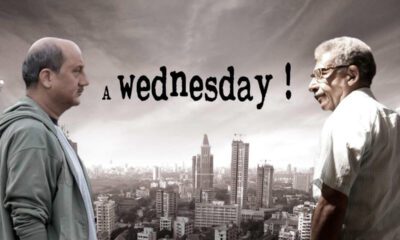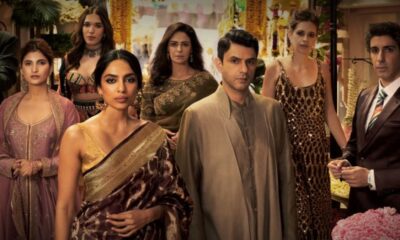Exclusive Premium Content
Snubbed by the Oscars…Again, When Will We Ever Learn?

The OIC (Optimistic Indian Critics) brigade had its eyes set on the Tamil film Koozhangal. We were hoping(against hope) that this one would get us the Oscar for best International film. Forget about making it into the shortlist. We didn’t even get beyond Round One.
Why do we get snubbed repeatedly at international awards? Are we sending the wrong films? In 2020 many felt Jallikattu the Malayalam film that went to the Oscars would “crack it”.It’s a cracked film for sure. Variety called it a “bonkers” film.Sure enough there is an element of madness in the storytelling and in the way the characters erupt in a sea of anarchy at the bullish provocation. .As a bull goes on a rampage in a village, the locals go off in the deep end with their own personal agenda, settling scores in an unsettling wave of selfinterest.As the fractured community goes into toxic gear ,it’s hard to tell which is more rampageous, the bull or the local community.
OIC (Optimistic Indian Critics) felt if Bong Joon Ho’s Korean film Parasite could win the Oscar for Best Picture why couldn’t Jallikattu crack it in the Best International film category? Firstly I don’t know how Parasite managed the miracle. It is an overrated and deeply flawed film leaving many questions on class difference unanswered.Secondly Parasite had a massive marketing campaign in operation for the Oscars. The Jallikattu team barely had ticket fare to fly to LA for the Oscars.
In 2018 Rima Das’ Assamese film Village Rockstars missed the Oscar.Like Koozhangal it peddled the Great Indian Poverty for Western audiences. For long stretches, nothing happens in this film about an impoverished little girl in Assam who dreams of owning her own guitar. Inert silences are considered a huge asset in films that glorify the Great Indian Poverty for a certain section of the Western audience which sees India and Indian cinema in two ways: either there is too much singing and dancing or there is too little to eat and to hope for.Village Rockstars falls into the latter category. It fits in rather snugly with the western audiences’ perception of an impoverished India.
A pre-pubescent girl Dhunu (Banita Das) wishes to own a guitar and form a musical band. It isn’t very clear where and how Dhunu’s yearnings sprouted into a veritable passion. Or how and why she wants to play rock music and own a rock band. The aspirational peg gives the debutant director a peg to pan her inquisitive camera across long stretches of silently stirring paddy fields and shots of adolescents running across middle hinterlands.
The film looks and feels like Satyajit Ray’s Pather Panchali, one of the three Indian films so far which have been shortlisted in the Oscars’ Best Foreign Language film category(the other two being Mother India and Lagaan). But it lacks the vision and lyricism of Ray ‘s exposition on rural poverty.Director Reema Das seems to use the theme of Indian Poverty as a peg for her aspirational story.
In 2016 the Marathi film Court directed by Mahesh Tamhane headed to LA for the Oscars after being selected by a jury headed by Amol Palekar, and returned home empty-handed.Last year the Tamil film Visaranaai was similarly snubbed at the Oscars.
Ketan Mehta who headed the jury for the selection of India’s official entry into the Oscars in 2017 says, “We’ve to understand that selection of a film is only a part of the process towards winning the Oscar. Marketing the film in the US, pitching it to the Oscar jury in Los Angeles is very important.”
Here is where Indian entries get thwarted and expelled from the Oscars race.
The legendary filmmaker Shahji Karun who headed the jury this year for the selection of our Oscar entry told me, “If you look at the movies that we are going to compete with at the Oscars, it’s like on the level of the Olympics.We should know what we are up against. Looking at the festivals across the world which win awards ,they all have one common thread of humanism in them. The idea of the human heart triumphing over all obstacles. That quality is common to all cultures. We wanted to select a film that celebrated humanism. If we selected a political films or a film on a specific cultural event, they could easily be bypassed(at the Oscars) if they don’t match with the political ideologies of the people viewing the film at the Oscars.”
In 2019 a ‘period’ Indian film unlike Lagaan , Devdas or Baahubali, entitled Period End Of Sentence had won the Oscar in the Best Short Documentary category. But is this really reason for us to rejoice after the repeated rebuffs we’ve been subjected to at the Oscars? And why must poverty still be the benchmark for international attention ? Has nothing changed since Satyajit Ray’s Pather Panchali? Every time the Academy Awards deign to look at us it always for films that highlight the squalor and deprivation at the grassroot level . Just take a look at the films from or about India that have received attention at the Oscars: Mehboob Khan’s Mother India, Mira Nair’s Salaam Bombay, Deepa Mehta’s Water, Danny Boyle’s Slumdog Millionaire…
What do we see in common here? Poverty, of course. Though this film about menstrual hardships in rural India is not technically an Indian film—its director Rayka Zehtabchi is an Iranian-American and its producer Melissa Burton is American– Period End Of Sentence is about empowering the rural Indian women , and its co-producer Guneet Monga is an Indian.








